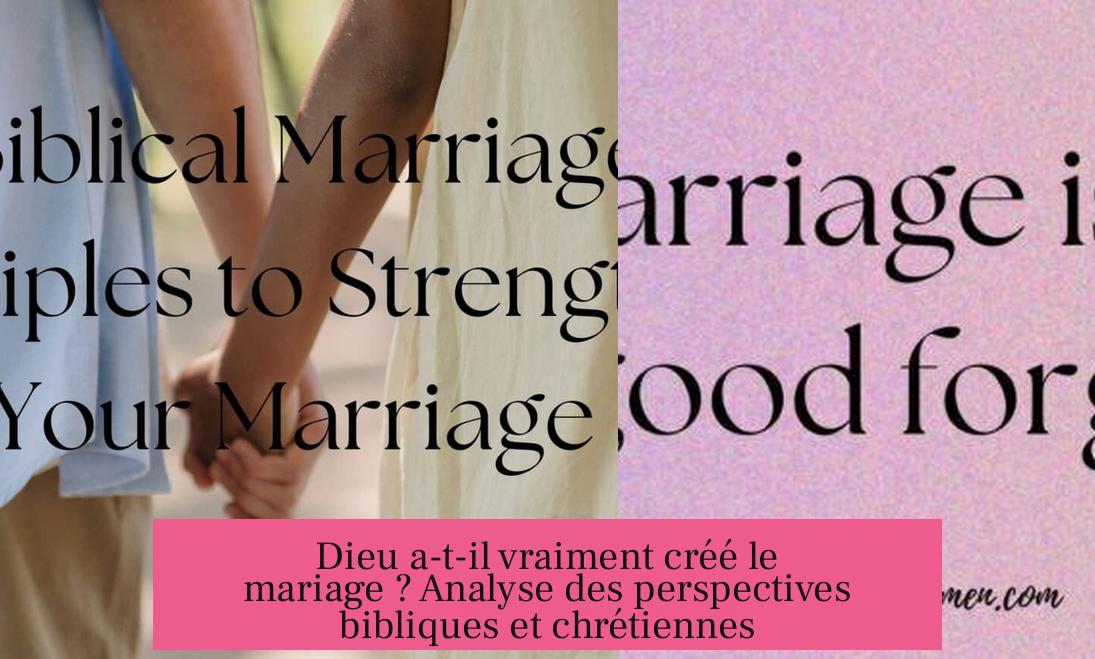Dieu a-t-il vraiment inventé le mariage ?

Le mariage est une institution divine selon la Bible, créée par Dieu pour répondre aux besoins humains fondamentaux de compagnonnage, procréation et soutien mutuel. Cette vision se base sur des textes clés de l’Ancien et du Nouveau Testament qui expliquent l’origine, la nature et le but du mariage.
Fondements bibliques du mariage
Le livre de la Genèse présente clairement la création de l’homme et de la femme par Dieu, et leur union sacrée. Dans Genèse 1:27-28, il est dit que Dieu crée l’homme et la femme à son image, puis les bénit pour qu’ils soient féconds et remplissent la terre. Ce passage souligne la complémentarité des sexes et leur vocation commune.
Dans Genèse 2:18-24, Dieu remarque que l’homme ne doit pas être seul et crée une femme à partir de sa côte, ce qui symbolise l’égalité et l’unité profonde entre eux. Le texte affirme que l’homme quittera ses parents, s’attachera à sa femme, et deviendra avec elle une seule chair, indiquant un lien d’intimité aussi bien spirituel que physique.
Le but du mariage selon Dieu
- Compagnonnage : Dieu crée le mariage pour répondre au besoin humain d’être accompagné (Genèse 2:18). Le passage de l’Ecclésiaste 4:9-12 renforce cette idée, rappelant que deux valent mieux qu’un, notamment pour s’entraider.
- Procréation : Le mariage est le cadre divinement institué pour avoir et élever des enfants, conformément au commandement d’être féconds (Genèse 1:28).
- Soutien mutuel et sanctification : Selon Éphésiens 5:25-33, l’homme et la femme s’aiment et se respectent pour favoriser la croissance spirituelle de chacun, reflétant la relation du Christ avec son Église.
Le design original et les rôles dans le mariage
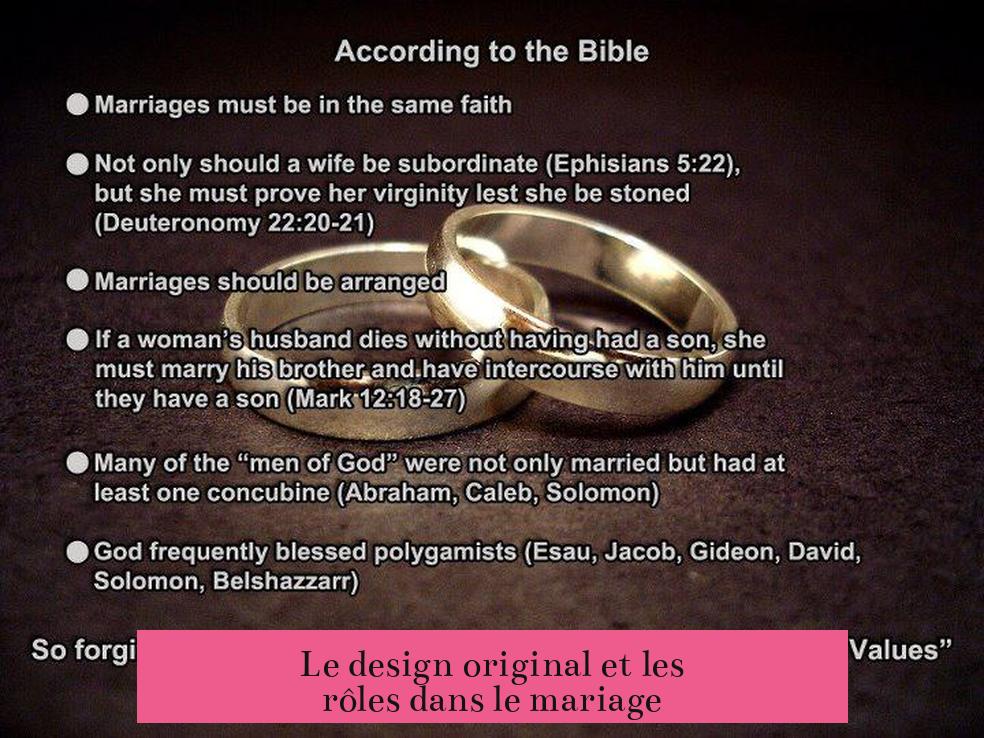
Le mariage est une alliance sacrée, généralement entre un homme et une femme. La Bible insiste sur son caractère indissoluble (Matthieu 19:6). Il forme un triangle : Dieu, l’homme et la femme, avec Dieu au centre, garantissant l’unité.
Le mari est appelé à guider sa famille avec amour sacrificiel, tenant un rôle de chef spirituel (Éphésiens 5:25). La femme est son aide compagne, son soutien volontaire fondé sur le respect (Genèse 2:18, 1 Corinthiens 11:9). Cette complémentarité ne remet pas en cause l’égalité des personnes, mais attribue des fonctions distinctes aux époux.
La nature et la signification du mariage
- L’union est exclusive et durable, approuvée par Dieu.
- Elle offre un cadre moral pour les relations sexuelles.
- La notion d’“une seule chair” souligne l’intimité et la fidélité.
- Le mariage est public, socialement reconnu et fondé sur une alliance.
- La Bible ne reconnaît pas le mariage homosexuel, réservant l’institution au couple homme-femme.
Pourquoi Dieu a-t-il institué le mariage ?
- Répondre au besoin de compagnonnage humain.
- Offrir un cadre morallement pur pour la sexualité.
- Assurer la procréation et l’éducation des enfants.
- Protéger les conjoints, notamment dans les contextes historiques.
- Limiter la promiscuité sexuelle et ses conséquences négatives.
- Permettre à l’humanité de remplir son mandat divin de multiplication et de gestion de la terre.
Mentions historiques et scripturaires
Le mariage originel est celui d’Adam et Ève, premier couple humain (Genèse 2:24). Le terme “mariage” apparaît pour la première fois en Genèse 34:8, dans un contexte social. Bien que la polygamie soit mentionnée dans l’Ancien Testament, celle-ci ne réfute pas le modèle originel du mariage monogame voulu par Dieu.
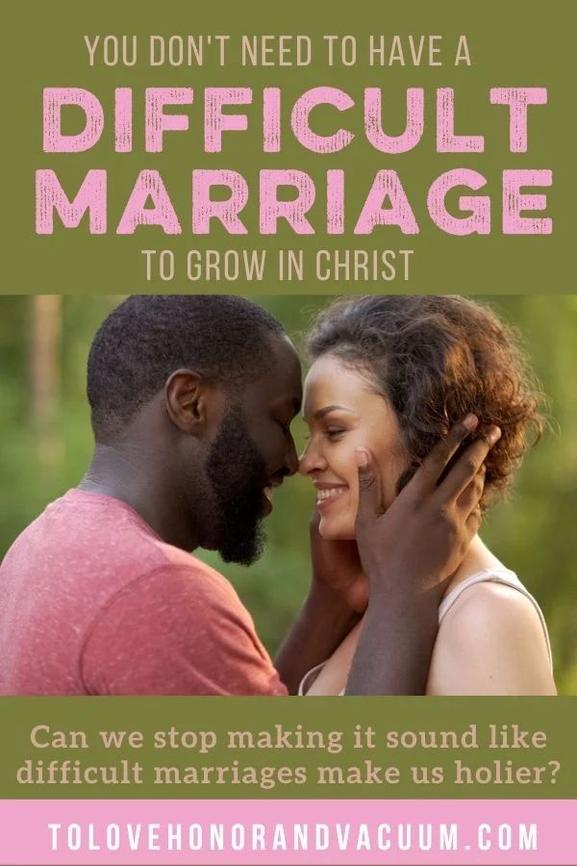
Points clés à retenir
- Le mariage est une institution divine, pas une invention humaine.
- Il vise loisir, procréation et soutien mutuel des époux.
- Il implique une alliance sacrée et durable entre un homme et une femme.
- Les rôles de mari et femme sont complémentaires, sans affecter l’égalité.
- Le mariage manifeste la relation entre le Christ et l’Église.
Did God Really Invent Marriage? A Deep Dive into Biblical and Christian Perspectives
Ah, marriage! This age-old institution often portrayed in romantic comedies and family dinners. But is marriage truly a divine invention? Or is it just a social contract crafted by humans over millennia? The question “Did God really invent marriage?” invites us on a fascinating journey across Scripture, history, and theology.
Let’s cut to the chase first:
Yes, according to the Bible and Christian doctrine, marriage is fundamentally God’s design—a sacred covenant established by Him for companionship, procreation, mutual support, and spiritual growth.
Now, before you roll your eyes thinking, “Here we go with another ‘biblical marriage only’ lecture,” stick around. We’ll unpack this idea with nuances, historical facts, and a touch of humor. Spoiler: It’s more complex and intriguing than just “God said so.”
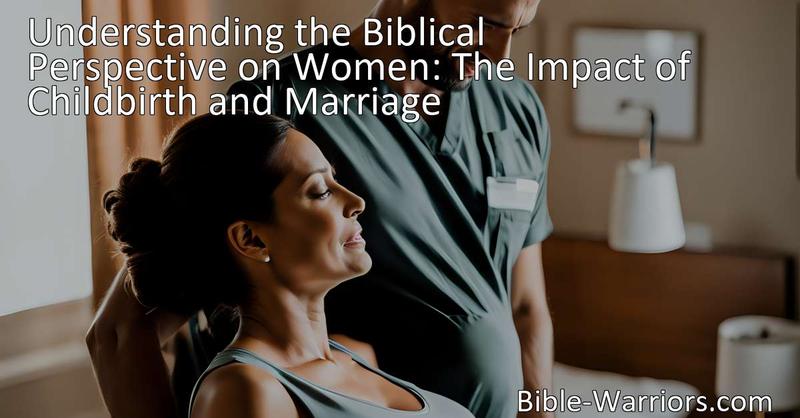
Marriage’s Biblical Roots: From Eden to Ephesians
The story begins in Genesis, the Old Testament’s grand opening. Genesis 1:27-28 tells us God created humans in His image, male and female. Then the divine commandment follows: “Be fruitful and multiply, and fill the earth and subdue it.” This isn’t just a biology lesson. It sets the stage for marriage as the divinely ordained partnership meant to steward the world together.
Genesis 2:18-24 deepens this. God observes Adam’s solitude and decides, “It is not good for man to be alone,” crafting Eve from Adam’s rib. For those wondering if Adam ever felt awkward about the whole rib thing—well, the symbolism is about equality and unity, not some grisly surgery. The passage famously concludes: “A man will leave his father and mother and be united to his wife, and they will become one flesh.”
This “one flesh” concept is central. It’s more than physical—it’s intimate and spiritual, a union forming a new family unit. It establishes marriage as a unique institution that unites individuals beyond themselves.
Why Did God Invent Marriage? Let’s Count the Reasons
- Companionship: Genesis 2:18 highlights that humans are made for relationships. Ecclesiastes 4:9-12 poetically echoes this by saying, “Two are better than one.” The simple truth? Humans need someone to lean on, even when life trips them up.
- Procreation: The first commandment hints that marriage is the proper setting for raising children. It’s no coincidence that children typically emerge from this “one flesh” union. The cycle of life continues.
- Mutual Support and Sanctification: Ephesians 5 paints a loving picture of marriage modeled after Christ and His Church. Husbands and wives are called to selfless love and respect, fostering spiritual growth in one another.
- Protection and Moral Order: Historically, marriage provided protection – especially for women – in chaotic cultural contexts. It created a framework to limit promiscuity and the potential emotional fallout.
So, God’s design is more than a romantic notion. It’s practical, social, spiritual, and designed for human flourishing.
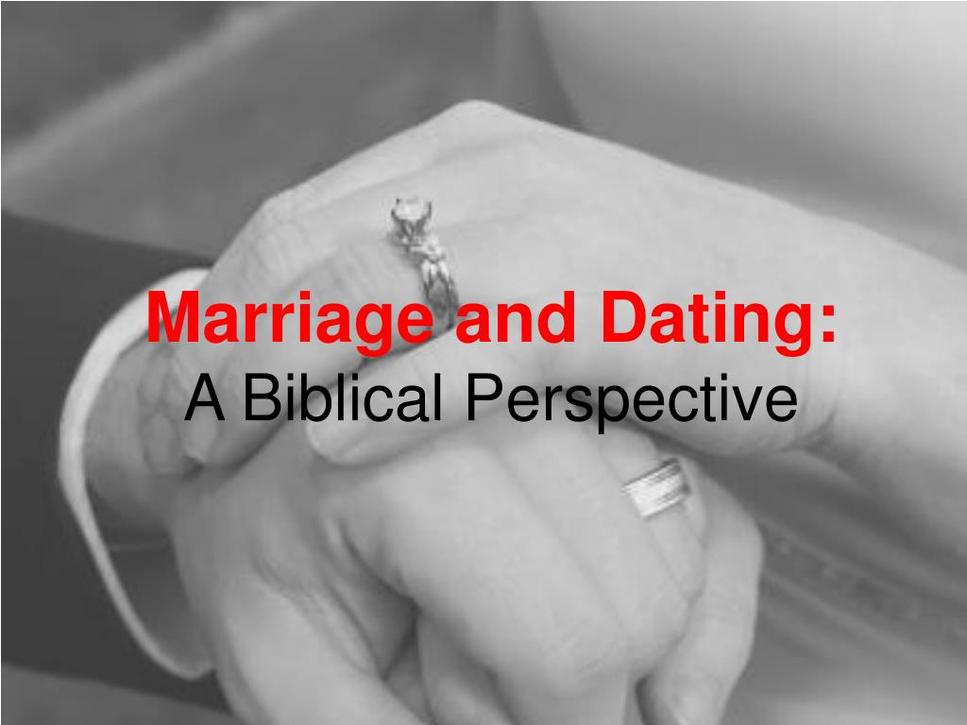
The Divine Triangle: God, Man, and Woman
Unlike many social contracts, marriage is not just about the man and the woman. It’s a covenant where God is the third corner of the triad. This triune focus influences unity — not just a legal binding but a spiritual one.
Far from subordinating the woman, the Bible uses the word “helper” for Eve, but in Hebrew, this term (ēzer) often describes God’s help. It’s a partnership, a mutual dependence, an honor. By creating woman from man’s rib (not foot or head), God signals equality.
Roles in Marriage: Leadership, Help, and Equality
Scripture outlines complementary roles but insists on equality of persons:
- Husband: Called to be a spiritual leader who serves selflessly and lovingly (Ephesians 5:25). Think less “boss” and more “devoted coach” of the family.
- Wife: A supportive partner, emotionally and spiritually, whose “submission” is respectful and voluntary, rooted in love, not coercion.
- Equality: Distinct roles do not imply hierarchy of value. Both husband and wife form a dynamic team, uniquely suited to complement each other.
This balance avoids clichés of patriarchy or matriarchy and honors the biblical ideal of harmonious cooperation.
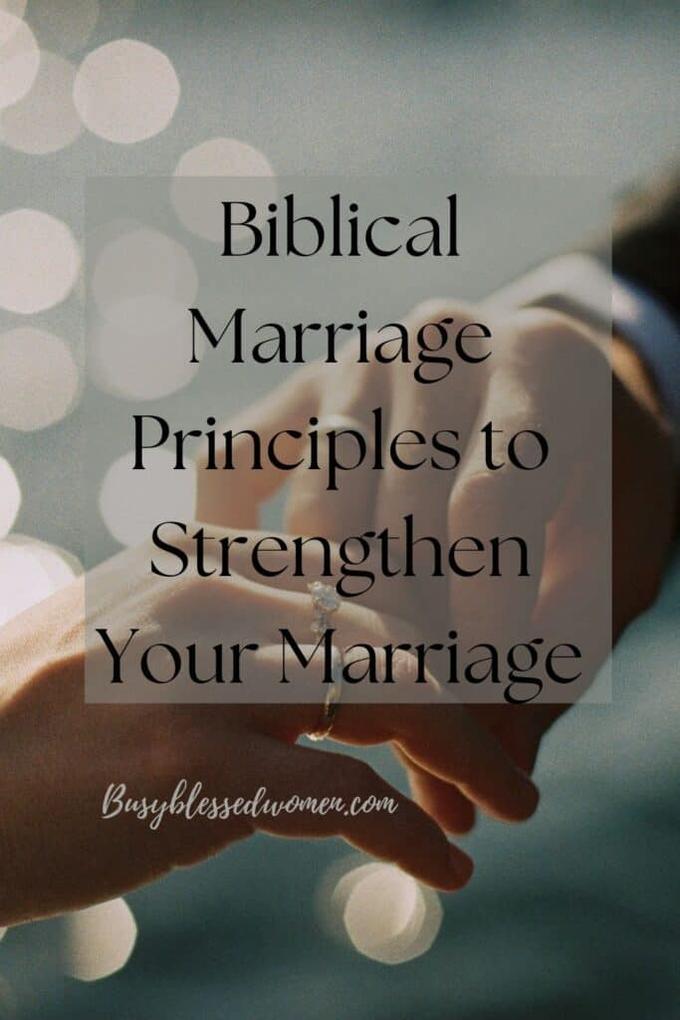
The Complex Historical Background and Diverse Christian Views
Before assuming a uniform Christian stance, let’s acknowledge history’s tangled web.
The Old Testament actually depicts polygyny—multiple wives for one man—as common among chiefs or kings. Yet scholars doubt it was standard for everyday people. Moreover, divine approval for polygamy is not explicitly given; rather, the Bible records many issues arising from such marriages—competing wives, jealousy, and family strife.
Fast forward to the New Testament, Jesus reaffirms the Genesis model: marriage is a union between one man and one woman until death parts them (Matthew 19:6). Divorce is discouraged; remarriage after divorce isn’t clearly authorized. Jesus even advocates for voluntary singleness for devoted service to God.
The Apostle Paul goes further, highlighting marriage as symbolic of Christ’s relationship with the Church. Paul also subtly elevates singleness as a preferable state, especially considering the urgency of Christian missions in his time.
Church Fathers and the Evolving View of Marriage
Interestingly, early Church Fathers like Augustine and Jerome greatly valued celibacy, sometimes even more than marriage. They viewed marriage as honorable but marred by lust and earthly troubles. Some even believed that widespread celibacy might hasten the Kingdom of God.
Others, like Tertullian and Gregory of Nyssa, had more balanced views. Both were married and recognized the happiness possible in marriage, yet warned it could be a state of bondage compared to the freedom of celibacy.
In the early centuries, Christian weddings lacked formal liturgy and could be simple agreements. The sacred, ritualistic ceremonies we now see in churches developed over time, with notable shifts in the Middle Ages when the Catholic Church formalized marriage as a sacrament at the Council of Verona (1184).
Contemporary Denominational Perspectives: Same Script, Different Tunes
Today’s Christian denominations still uphold marriage as sacred but vary widely on interpretations:
- Roman Catholicism: Marriage is a sacrament, bound by God, unbreakable while both spouses live. Divorce doesn’t sever the spiritual bond, though civil divorce can change legal status. Procreation is central; contraception is generally forbidden except for natural family planning.
- Protestantism: Marriage is viewed as a sacred covenant but not a sacrament. There is more diversity in teachings on gender roles, birth control, and divorce. Sexual pleasure within marriage is a gift, and roles can vary widely.
- Modern Challenges: Questions about same-sex marriage, interfaith unions, and divorce continue to provoke debate without uniform answers across Christianity.
Look at it this way: Christianity is a grand orchestra playing variations on a core melody that God invented marriage. Different denominations emphasize different instruments but agree on the theme.
Common Questions You Might Wonder About
Okay, let’s get practical. Does God’s design mean everyone must marry? Not at all. Jesus and Paul both extol singleness for those who can accept it. Marriage is a calling, not a requirement.
Did God invent polygamy? No clear endorsement exists; it appears more as tolerated practice in ancient culture, not God’s ideal design.
What about same-sex marriage? Biblical texts consistently define marriage as between a man and a woman; most traditional Christian denominations hold to that definition.
Is marriage still relevant? The Bible’s principles offer timeless wisdom, but cultural expressions evolve. The heart of marriage—love, unity, faithfulness—remains crucial in any era.
Wrapping it Up: The Divine Blueprint of Marriage
Marriage, as portrayed in the Bible and Christian doctrine, was indeed invented by God. It is a divine institution designed for:
- Companionship, addressing the human need for relationship.
- Procreation and parenting, fulfilling the mandate to multiply and steward the earth.
- Mutual support and spiritual sanctification, reflecting the love of Christ for His Church.
- Providing a morally appropriate and protective framework for sexual relations.
God’s original design frames marriage as a sacred, lifelong union—“one flesh”—that serves both practical and spiritual purposes.
So, when you wonder if God really invented marriage, Scripture, history, and Christian teachings collectively say: “Oui, absolument!”
Now, whether humans always live up to God’s ideal is a whole other story—with plenty of room for human struggle, grace, and plenty of wedding cake.
Le mariage a-t-il été inventé par Dieu selon la Bible ?
La Bible présente le mariage comme une institution ordonnée par Dieu, notamment dans la Genèse où homme et femme deviennent “une seule chair”. Cependant, les pratiques et interprétations ont varié dans le temps et entre communautés.
Est-ce que Jésus a institué le mariage ?
Jésus n’a pas institué le mariage, mais il a réaffirmé son caractère sacré, insistant sur l’union indissoluble entre époux selon Dieu. Il valorisait aussi la singletude comme un appel spirituel.
Le mariage est-il toujours nécessaire selon le christianisme ?
Non, le mariage n’est pas obligatoire. Les premiers chrétiens valorisaient aussi le célibat, surtout dans les vocations sacerdotales et monastiques, qui exigeaient abstinence sexuelle.
Pourquoi y avait-il la polygamie dans l’Ancien Testament alors ?
La polygamie était présente parmi les patriarches et rois, mais elle n’était pas la norme pour tous. Cette pratique posait souvent problème, et les textes ne la présentent pas comme un modèle divin parfait.
Le divorce est-il permis dans le christianisme ?
Selon Jésus et l’Église catholique, le mariage crée un lien indissoluble. Le divorce est vu comme une rupture douloureuse, possible mais non souhaitée, et la remariage y est souvent restreint.
Le mariage civil est-il différent du mariage religieux ?
Dans certains pays, le mariage civil est une nécessité légale distincte du religieux. Dans d’autres, le mariage religieux validé par l’État a les mêmes effets civils, y compris sur le divorce.

